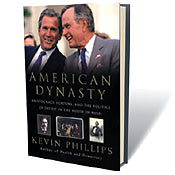
Kevin Phillips is that rarest of creatures, a reverse neocon, a Republican who has seen the light. As a young politics wonk poring over voting figures in the mid-sixties, he realized that the Democratic Party was growing estranged from many of its traditional constituents, and that the South was ready for a shift. His 1969 book The Emerging Republican Majority got him a job in the Nixon White House (he languished in John Mitchell’s Justice Department, and quit in 1970).
Back then, however, a Bush dynasty was not exactly what Phillips had in mind. He began a slow-motion apostasy in the eighties, as he gradually began to realize that the Republicans were the party of the rich, and the rich were getting richer. He kept thinking that the American public would notice this, too.
American Dynasty (Viking; $25.95) wears the mantle of historiography, but it’s a different kind of book— an indictment of the Bush family for un-American activities: impersonating royalty. It’s also a screed, political genealogy as rogues’ gallery (a familiar enough genre in Kennedy literature), tracing various nefarious qualities through several generations. There’s aggressive, amoral banker George Herbert Walker—even his family didn’t like him—the original source of the family gift for turning insider’s knowledge into profit. His protégé Samuel Bush, and then Prescott Bush, who was able to use their Brown Brothers Harriman launching pad to get into the political stratosphere.
Then there are the Georges, I and II; weaned at Andover, taught their frat-boy manners at Skull and Bones at Yale, dipped in the oil business for that healthy, wealthy sheen, and sent off to rule the world. Phillips, who grew up in a middle-class family in the North Bronx, recoils at the sight of this American monarchy in a way that seems almost quaint.
For a certain kind of Democrat, the book will be irresistible. The red meat is much the same as that served at Michael Moore’s table, but here there are no baseball caps in sight. Phillips has cultivated a certain effeteness of prose style, the high-handed sarcasm of those (think Gore Vidal, though not as nimble) who’ve spent a lot of time absorbing the wisdom of the Founding Fathers.
The key concept in American Dynasty is restoration, the son regaining his father’s place. Especially satisfying is his catalogue of such patrilineal traits as rewarding loyalists, savoring revenge, and executive prerogative. Then there are the cultural affinities, like energy deregulation (championed by George H.W., it comes to fruition in his son’s close relationship with Enron) and the family’s affiliation with the intelligence community.
Phillips compiles an extensive list of alleged, largely unproven Bush malfeasance, an ominous smoke-signal litany: Walker’s forays into German arms trading; George H.W. Bush’s alleged involvement in the Bay of Pigs; a cover-up of Cuban money funneled through Bush cronies in Texas to the Watergate burglars; the October Surprise, where secret Reagan-campaign diplomacy was alleged to have kept the hostages in Iran until Reagan’s inauguration; the cover-up of George W. Bush’s alleged cocaine conviction.
It doesn’t take much imagination to see that these data points form the outline of a rather substantial octopus—the Loch Ness monster of American politics. But one doesn’t have to believe all the allegations to believe it’s no myth—in fact, it’s something like the national pet. Some of its larger tentacles—the Carlyle Group, Halliburton, and until recently, Enron—are all around.
Phillips can discern no lurking demographic trend—alas, alas—that will put the country back on course. Rather, he shares with many older Americans the sense that the political bargain has changed. He counts himself as one of “those who believed that the democratic values of World War II and Franklin D. Roosevelt had become an inextricable part of the national social fabric.” He had always believed that describing the world was one way to change it. But there’s a bedrock of exhaustion in this book, the idea that mustering facts and making arguments may not be sufficient to serve the dynasty its just desserts. He’s not an apostate, exactly; it’s the world that’s moved on.
Buy American Dynasty at bn.com.